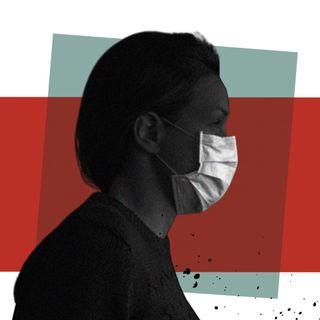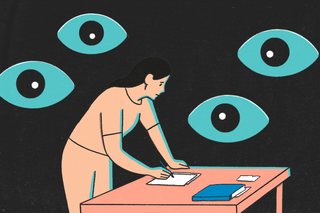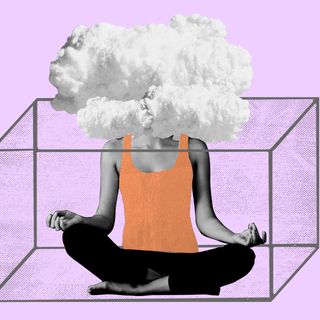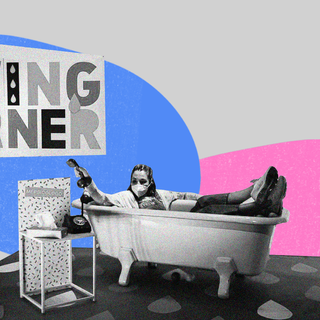
What It’s Like To Live With: Cerebral Palsy
“I was admitted late to school because of CP. My mother used to teach me the basics at home before that.”

What It’s Like to Live With explores the stories of people who see and experience every day a little differently.
Trigger Warning: The article below mentions bullying.
I actually wasn’t very well aware of the existence of the word “disabled” — leave alone the exact name of my disability — until the last week of March this year. The “Neurodiversity Celebration Week” introduced me to the overall concept of disability. I got to know an autistic individual during this time, who told me that I might have dyspraxia after I mentioned to her that I have difficulty controlling different parts of my body.
This prompted me to research different types of neurodivergence, and other neurological conditions. By the end of it, I was like 200% sure that I have dyspraxia. It is when I talked to my family about it that my eldest sister told me I actually have cerebral palsy. I understand my parents chose not to tell me about my disability until I was emotionally mature enough to find out about it, and handle it on my own. But I was certainly relieved to finally understand what’s going on.
This is when I started researching CP. Suddenly, everything started to make sense.
Turns out, I was admitted late to school because of CP. My mother used to teach me the basics at home before that. Then, my parents decided to let me go to a school with a significantly lower number of students so that the teachers could pay more attention to me.
I’m still a student now and I’m currently preparing for my HSLC [High School Leaving Certificate] exams.
At first, I was honestly so excited about being able to go to school that I didn’t even pay attention to how some of the kids and their parents used to look at me — surprised, curious, pitiful even. But as time passed, I became more and more aware of what was happening around me. Those bewildered looks increased when I started writing while standing up because I (still) get dizzy when I try to do it while sitting down. It’s exhausting, all the more so because of my jumpy, involuntary movements thanks to my dyskinetic CP.
That’s actually one of the reasons why I wanted to hire a scribe for my upcoming HSLC exams. But my parents are forcing me to write on my own — albeit with the extra amount of time they requested the state government to allow me. They think no parent would send their kid to be a scribe during the pandemic, and that even if we do manage to get a scribe, they probably wouldn’t be able to understand what I’m trying to say because CP impairs my speech too.
Related on The Swaddle:
Why Disability Activists Argue Against Labels Like ‘Differently Abled’
I feel like I absolutely suck at friendships. As a kid, I always used to beg my parents to let me go to school because I wanted to have some friends — just like my two elder sisters did. I wanted to dress up with them, play with them, and not feel like an “extra,” you know? I always felt that way whenever I tried to get along with my sisters’ friends.
In 2018, I moved to a new school. This place, too, had fewer students. But the kids were just too scary for me.
[My classmates] used to bully me by purposefully making loud noises, putting fake spiders in my books, and poking me from behind during classes. Why? Just to scare me. Apparently, my increased involuntary movements due to nervousness were entertaining to them.
The only people I could call my “friends” are ones I met on the internet. To this day, it’s like that.
In terms of relationships, too, I met all of my boyfriends online — I’ve had three relationships so far. I met them online because it feels practically impossible for me to be able to call someone I know in real life, a “friend” — leave alone a “partner.”
I remember one of those relationships being a disaster because I felt terrible about me not being able to do voice or video calls with my boyfriend. Once, after I forced myself to do a video call with him, he ended up cutting the call very abruptly because I just couldn’t utter a single word due to nervousness.
Growing up, I was always interested in fashion, and at some point, I even wanted to be a fashion designer. But eventually, I realized it requires a lot more than just designing the dresses on paper — stitching and stuff like that are pretty much impossible for me as a person with CP. In fact, I gave up on the dream before I even knew how severe my disability is. I figured I can’t really control my body like the fashion designers that I used to see on TV did.
Learning about my disability, however, has had a rather positive impact on my mental health, I’d say. Earlier, I used to feel bad about myself when people used to call me “physically challenged,” “handicapped,” “slow,” and “differently-or-specially-abled.” Deep down, I’ve always felt these words didn’t describe me. The word “disabled” fits much better because it doesn’t imply that I have challenges I can never overcome, and it doesn’t alienate me by calling me “different” or “special.”
After I spoke to my family this year, I also found out why I got CP in the first place — it was due to the negligence of the doctors responsible for me when I had infantile jaundice.
I’m still discovering new things about my disability and learning why I am the way I am.
This interview has been condensed and edited for clarity. As told to Devrupa Rakshit by Rhea Laskar.
Devrupa Rakshit is an Associate Editor at The Swaddle. She is a lawyer by education, a poet by accident, a painter by shaukh, and autistic by birth. You can find her on Instagram @devruparakshit.
Related


How Self‑Care Went From Scented Candles to Affirmations, and Why It Still Doesn’t Help
